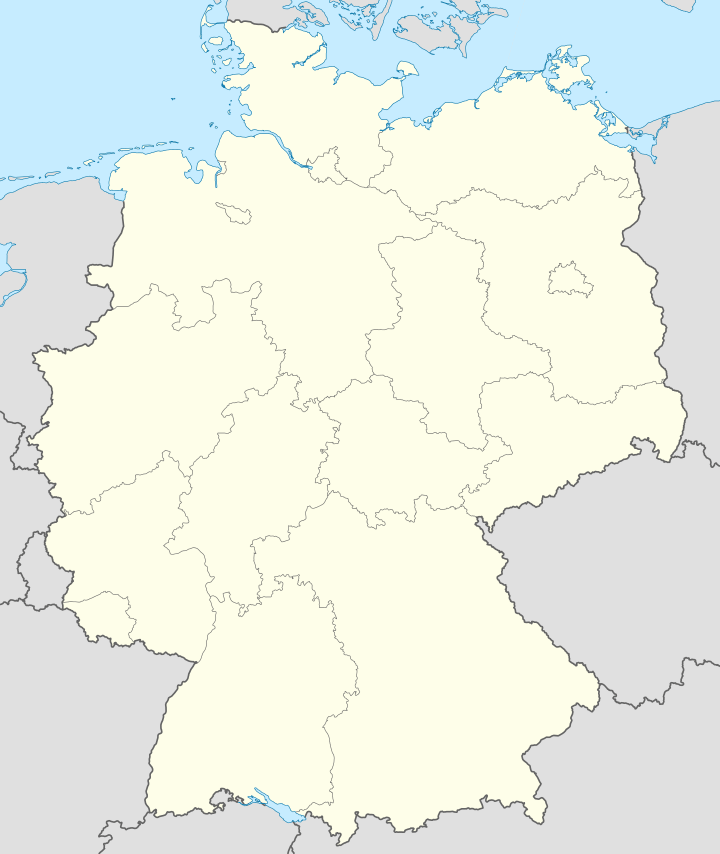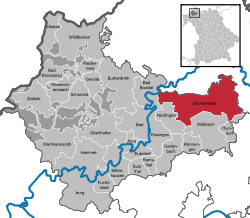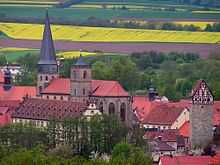Münnerstadt
| Münnerstadt | ||
|---|---|---|
| ||
 Münnerstadt | ||
Location of Münnerstadt within Bad Kissingen district  | ||
| Coordinates: 50°15′N 10°10′E / 50.250°N 10.167°ECoordinates: 50°15′N 10°10′E / 50.250°N 10.167°E | ||
| Country | Germany | |
| State | Bavaria | |
| Admin. region | Unterfranken | |
| District | Bad Kissingen | |
| Government | ||
| • Mayor | Helmut Blank (CSU) | |
| Area | ||
| • Total | 93.11 km2 (35.95 sq mi) | |
| Population (2013-12-31)[1] | ||
| • Total | 7,686 | |
| • Density | 83/km2 (210/sq mi) | |
| Time zone | CET/CEST (UTC+1/+2) | |
| Postal codes | 97702 | |
| Dialling codes | 09733 | |
| Vehicle registration | KG | |
| Website | www.muennerstadt.de | |
Münnerstadt is a town in the district of Bad Kissingen in Bavaria, Germany. It borders with the towns of Burglauer, Bad Bocklet, Nüdlingen, Maßbach, Großbardorf, and Strahlungen. As of 2000 it has a population of 8,300, and covers an area of 95 km².

The town is located in the southern portion of the Rhön Mountains. The Lauer River (a tributary of the Franconian Saale) flows directly through the town.
History
Münnerstadt area has been inhabited since approximately 2100 BC. Early Celtic settlers farmed in the area of Grosswenkheim, Maria Bildhausen and Althausen (all towns within the city boundaries). Around the time of the Birth of Christ, Thuringian and soon after, Franconian settlers moved into the area and used the surrounding hills (Michelsberg) and forests for protection in times of danger. By the 5th century AD a village existed in the area where the base of Michelsberg meets the Lauer River, a tributary of the Franconian Saale river.
On 28 December 770, Egi and Sigihilt donated their complete estate including vineyards to the "Munirihestat" monastery of Fulda. This was the first certified mention of Münnerstadt. Between 770 and 876 there were 18 certificates that proved Münnerstadt was of great importance during the Carolingian period. In 1156 Hermann von Stahleck sponsored the construction of the monastery in Maria Bildhausen. In the 12th century Count Henneberg began to establish his presence in Münnerstadt. Henneberg was also the name of the state in Holy Roman Empire in which Münnerstadt was located. At this time Henneberg built a small castle on the Lauer River and the inhabitants of the old Münnerstadt left their unprotected dwellings and moved within the shadows of the new castle.
Middle Ages
Early in the 13th century Münnerstadt began the fortification of the town with the construction of a wall (1251) and four gates around the entire town to protect them from invading forces. With the addition of the Market (1271), the city court, city council (1279) and city seal (1287), Münnerstadt began a period of prosperity. The grain measurement was the standard in 38 towns in Lower Franconia. In (1231) the Teutonic Knights took over the Ministry of Münnerstadt. In (1279) the Augustine Monastery in Münnerstadt was established.
As a result of the growth and prosperity brought upon Münnerstadt by Count von Henneberg, Emperor Louis IV gave the township its city rights. Münnerstadt became an important base against the Würzburg princely Bishops, but inheritance and financial problems in the mid 14th century led to them overtaking some assets in Münnerstadt. In the late 14th century the city inhabitants rose up to kick out both of the ruling parties but were crushed. In 1385 new laws were established that ruled the way of life within the walls of the city. In 1492 city aristocrats sponsored the construction of an altar in the Pfarrkirche by Tilman Riemenschneider. This was his first contract for a large altar.
In the early 16th century Martin Luther's predication created an uproar by the farmers and citizens and burned down the monastery in Maria Bildhausen, but the riot was quelled by the hard reprisal by the Prince-Bishops of Würzburg. The Augustinian monks had to leave town when the first evangelical priest took over the Ministry of Münnerstadt in 1552. In 1585 Prince-Bischop Julius Echter purchased a large part of the city that were still not owned by the Bishops of Würzburg. As a result approximately 400 Protestants, mostly craftsmen, left the city. In 1631 the 30 years war hit the city and region hard and the Swedish invaders took the city. In 1641 a miracle is supposed to have taken place that protected Münnerstadt from more devastation. The Augustiner returned in 1652 and rebuilt their monastery and in 1685 they took back power of the Ministry of Münnerstadt.
Annexation
During the Napoleonic Wars, Franconia, and with it Münnerstadt, was annexed by Bavaria in 1803. As a result the abbey of Maria Bildhausen was disbanded, the buildings sold or destroyed. In 1804 Münnerstadt became the seat of a federal court. The Teutonic Order was required to leave the city and its possessions were claimed by the city. The Congress of Vienna officially annexed Franconia and Münnerstadt to Bavaria. The city was the local government seat but continued to lose its importance and by the early 1900s it was just a locality in the county of Bad Kissingen.
Modern times
During World War II, the Marienkapelle, houses and one of the city gates were destroyed by bombing and upon entry of the American forces. With the establishment of East Germany, businesses from Thuringia moved to Münnerstadt. Some of them have attained international importance.
In 1990 traffic on the Highway B19 was rerouted from the city center to around the west side of town and the railway to Erfurt was opened after a 50 year pause. In winter of 2005 Autobahn A71 was opened for traffic. Its 600 meter long bridge between Münnerstadt and Althausen has changed the scenery greatly.
References
- ↑ "Fortschreibung des Bevölkerungsstandes". Bayerisches Landesamt für Statistik und Datenverarbeitung (in German). 31 December 2013.
External links
- Unofficial and private website (German)
- Official website (German)
| ||||||||
